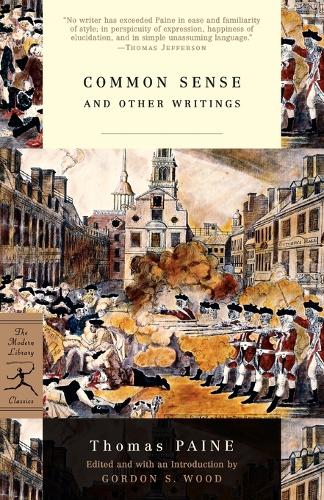
Common Sense: and Other Writings
(Paperback)
Available Formats
Paperback
Published: 24th October 2012
Paperback
Published: 15th January 2017
Hardback
Published: 25th June 2019
Paperback
Published: 9th April 2014
Paperback
Published: 2nd January 2018
Paperback
Published: 1st March 2005
Paperback
Published: 11th February 2003
Hardback
Published: 3rd March 2021
Publishing Details
Common Sense: and Other Writings
By (Author) Thomas Paine
Edited by Gordon S. Wood
Random House USA Inc
Modern Library Inc
11th February 2003
United States
Classifications
General
Non Fiction
320.01
Physical Properties
Paperback
352
Width 132mm, Height 203mm, Spine 19mm
295g
Description
Edited and with an Wood.
Reviews
No writer has exceeded Paine in ease and familiarity of style; in perspicuity of expression, happiness of elucidation, and in simple unassuming language. Thomas Jefferson
Author Bio
Thomas Paine was born in Norfolk, England, on January 29, 1737. He received a basic education in history, mathematics, and science, but left school at age 13 to apprentice in his father's corsetmaking shop. In 1757, he spent time at sea aboard the privateer ship King of Prussia, and later found employment as a journeyman staymaker in London. All the while, Paine continued to study on his own, influenced by the work of two leading figures of the Enlightenment, Isaac Newton and John Locke. He began writing political pamphlets, and at the urging of Benjamin Franklin, emigrated to Philadelphia in 1774 to work as an editor for The Pennsylvania Magazine. In 1776, he published Common Sense, which called for America's political freedom from England. The pamphlet sold more than 150,000 copies in three months. Paine next published The American Crisis during the Revolutionary War, inspiring George Washington to read it to his troops at Valley Forge. By the end of the Revolution, however, Paine's influence had run its course, and he fell out of political favor. He returned to Europe, where he published his treatise Rights of Man, which led to his arrest on charges of high treason. Disillusioned with life abroad, he returned to the U.S. to find himself vilifed as an agitator and atheist. He died in obscurity in New York City in 1809.
